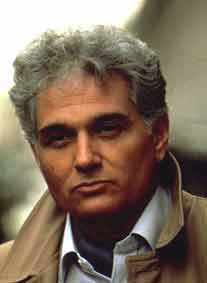Derrida

Jacques Derrida was born on this day in 1930 in El Biar, Algeria. He grew up in an atmosphere of terror as a Jew confronted by anti-Semitism, especially within Vichy-controlled Algeria during World War II. When he was 10, in fact, all Jews were expelled from Algeria's public schools, and violence against Jews was officially sanctioned.
In France from the age of 18, he was moved to pursue philosophy after hearing a radio broadcast about fellow Algerian native Albert Camus, and enrolled in philosophy courses at the Ecole Normale Superieure in Paris. Although he was initially attracted to the thought of Jean-Paul Sartre, he later repudiated it and immersed himself in the writings of Edmund Husserl. By the 1960s, Derrida was teaching philosophy in Paris universities and became director of the Ecole des Hautes Etudes en Science Sociales.
With Speech and Phenomena (1967), Derrida began to launch his critique of Western philosophy's treatment of "writing" as a poor stepchild of the "voice," which was typically thought to have a more intimate connection with thought and the essence of external philosophical truth. Employing an analytical method he called "deconstruction" (coined by Martin Heidegger), with close textual analysis of philosophical writings which attempt to dismiss the significance of "writing," Derrida revealed the internal inconsistency in attempts to define some higher reality: they are always built on metaphors and literary euphemisms. His rather nihilist proposal was that "there is nothing outside the text."
Language is a system, Derrida argued, not of objective connections between word and meaning, but of differences in sounds, as Saussure proposed. The task of the philosopher, in Derrida's view (expressed in Writing and Difference, 1978), is to analyze the system of language for its own properties rather than to imagine a reality beyond; to understand, for example, the expectations inherent in the way a writer organizes the differences which produce meaning in language, and the dynamics by which the writer seizes the reader's deference to his or her use of the text in order to transact communication (or fails to seize it). Although Derrida is not a literary critic, his use of "deconstruction" and his elevation of the status of the text spawned a popular movement in literary criticism. Derrida continued his campaign against transcendental truth outside of texts with an analysis of Plato in Dissemination (1972), focusing on the inherent indeterminacy of language.
Much of the rest of his writings have consisted of playful variations of deconstructive analysis. In Glas (1974), Derrida employs three columns of text to achieve a "discussion" among Derrida (in the center), Hegel (on the left) and Genet (on the right), illustrating that texts are distinguished primarily by the structure of their metaphors. He similarly took on Nietzsche in Spurs (1976); Freud in The Post Card (1980), using metaphors of postal communication to deconstruct psychoanalysis; and Heidegger in Of Spirit (1987). Derrida died on October 9, 2004 in Paris.
Labels: Freud, Literature, Philosophy





3 Comments:
"He grew up in an atmosphere of terror as a Jew confronted by the anti-Semitism of Algeria's Christian majority."
Don't you mean Algeria's Muslim majority?
Thanks for the comment. I went back to my sources and found the same formulation -- "Algeria's Christian majority." Poking under the surface, however, it is clear that under Vichy rule during World War II, anti-Semitic Christians were clearly in charge, even if they could not be called a "majority." I've changed my text to clarify this situation.
"Employing an analytical method he called 'deconstruction' (coined by Martin Heidegger),"
Heidegger invented the method, but called it "destruction", as in de-structur-ing, unpacking, the text. Derrida uses that term in the early drafts of Of Grammatology, and then replaced it with "deconstruction" before publication. So Derrida can take the credit/blame for the coining/counterfeiting.
Post a Comment
Subscribe to Post Comments [Atom]
<< Home